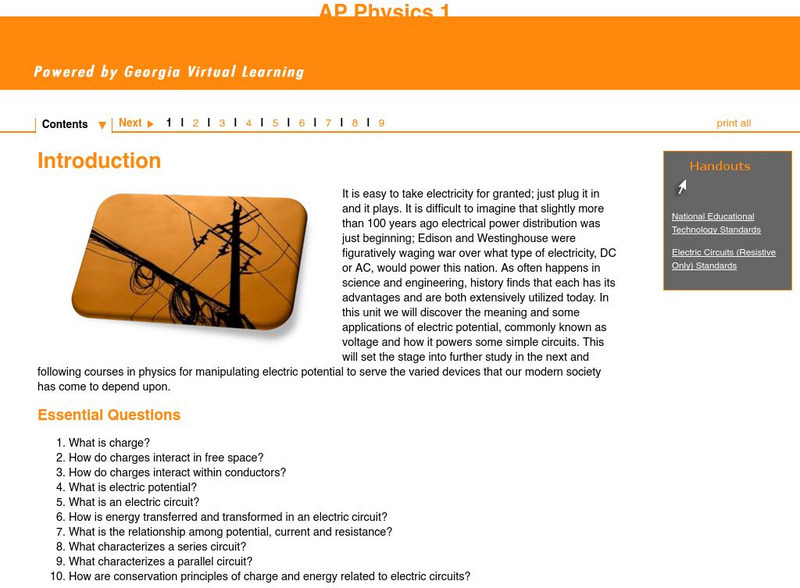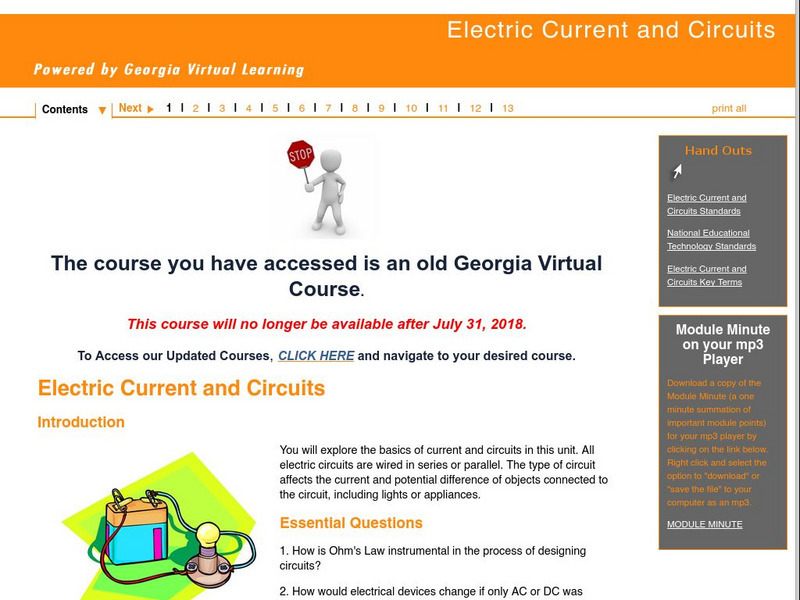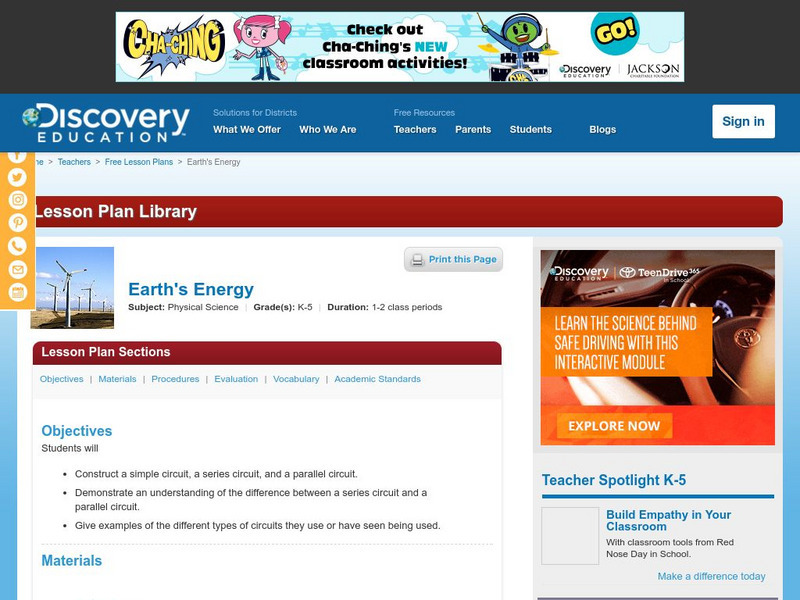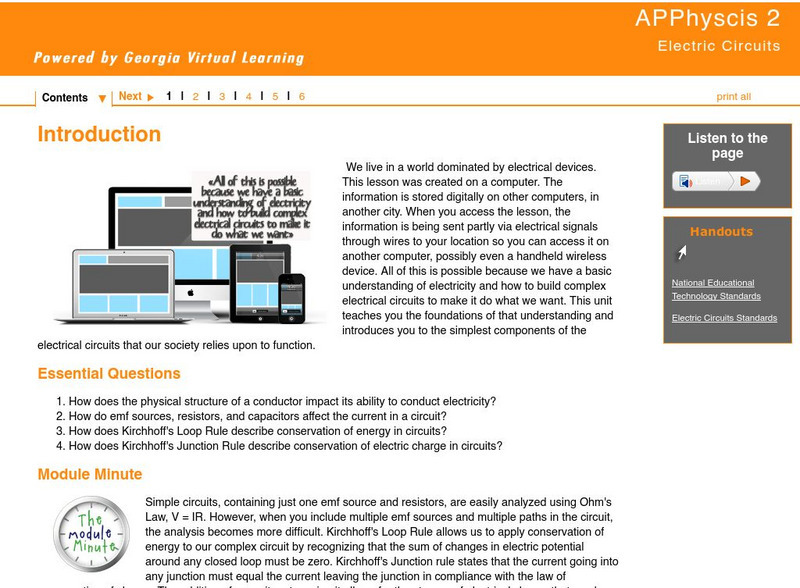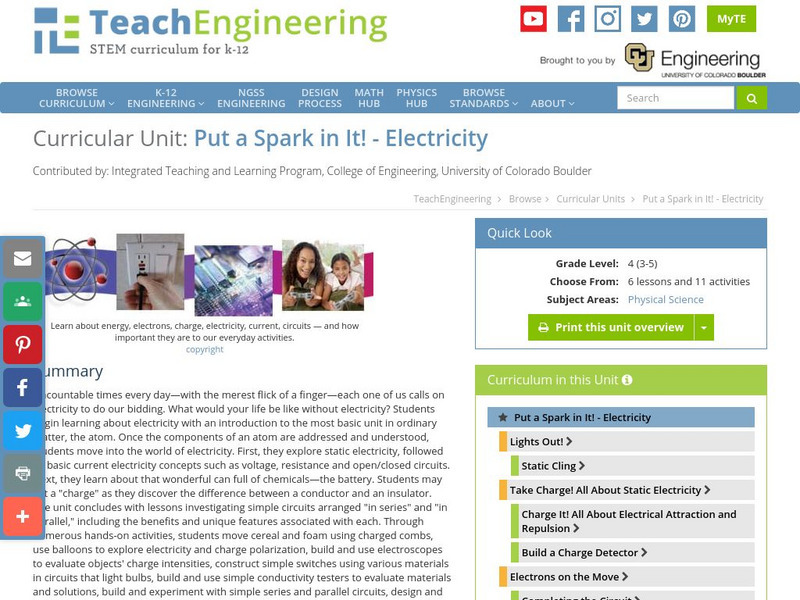Hi, what do you want to do?
Boston University
Elementary Physics: Current and Resistance
A general summary of electrical resistance including a comparison of AC and DC current.
Georgia Department of Education
Ga Virtual Learning: Ap Physics 1: Electric Circuits
In this unit students discover the meaning and some applications of electric potential, commonly known as voltage, and how it powers some simple circuits.
Georgia Department of Education
Ga Virtual Learning: Electric Current and Circuits
Students have the opportunity to explore the basics of current and circuits in this online module. Some of the activities include interactive animations, informational text, practice problems, and lab experiments.
Wikimedia
Wikipedia: Series and Parallel Circuits
Wikipedia offers information on two basic ways of wiring components in electrical circuits, series and parallel circuits.
CK-12 Foundation
Ck 12: Parallel Circuits
[Free Registration/Login may be required to access all resource tools.] In this lesson, students learn about parallel circuit design, and how to calculate equivalent resistance from resistors in a parallel circuit.
Other
Southwest Tech: Combination Circuit
Explains what a combination circuit is and how to calculate the resistance and amperage values in this type of circuit.
Georgia Department of Education
Ga Virtual Learning: Steady State Direct Current With Batteries & Resistors Only
In this interactive tutorial, students will analyze series circuits and parallel circuits along with complex circuits composed of elements in series and parallel. Learners will use schematics to help them understand these circuits....
Discovery Education
Discovery Education: Earth's Energy
A hands-on lesson for helping students understand simple circuits, series circuits, and parallel circuits, and the differences between the three.
TeachEngineering
Teach Engineering: One Path
Students learn that charge movement through a circuit depends on the resistance and arrangement of the circuit components. In a hands-on activity, students build and investigate the characteristics of series circuits. In another...
Georgia State University
Georgia State University: Hyper Physics: Resistor Combinations
At this site from Georgia State University parallel and series connections of resistors are explained and illustrated. Equations for computing the overal voltage, current, and resistance of such circuits are given and explained.
CK-12 Foundation
Ck 12: Physics Simulation: Dollhouse
[Free Registration/Login Required] Learn about the analysis of parallel circuits in the context of a realistic household circuit using our interactive simulation. A PDF worksheet and a video tutorial are also available. [3:24]
CK-12 Foundation
Ck 12: Physics Simulation: Marquee Lights
[Free Registration/Login Required] Learn about different ways you can wire an electric circuit, and how the brightness of the lights depends on how they are configured using this interactive simulation. A PDF worksheet and a video...
Georgia Department of Education
Ga Virtual Learning: Ap Physics 2: Electric Circuits
This unit teaches students the foundations of electrical circuits and introduces them to their simplest components. Covers series and parallel circuits, Kirchhoff's Rules, Ohm's Law, RC circuits, resistivity, and capacitance.
Science and Mathematics Initiative for Learning Enhancement (SMILE)
Smile: Series and Parallel Circuits
A teacher lesson plan which could be easily converted into an idea for a student project or presentation. Ideal for pre-high school students. This page describes an activity in which the history of electric circuits, the nature of...
Science and Mathematics Initiative for Learning Enhancement (SMILE)
Smile: Resistances in Series and Parallel Circuits
A teacher lesson plan is provided here. This page describes two activities in which the effect of multiple resistors on the current and overall resistance of both series and parallel circuits are investigated. Complete activity...
TeachEngineering
Teach Engineering: Lights On!
Students in this activity will build simple circuits using a battery, wires, and light bulbs. This activity allows students to examine how electricity is conducted through a light bulb using a battery as a power source. Students will...
Concord Consortium
Concord Consortium: Dc Circuits: Series Parallel Resistances (Sparks 3)
Answer questions regarding voltage drops across resistors and currents through them in such circuits. Practice calculating the effective resistances of a set of resistances in series and parallel.
TeachEngineering
Teach Engineering: Put a Spark in It! Electricity
Uncountable times every day "with the merest flick of a finger"each one of us calls on electricity to do our bidding. What would your life be like without electricity? Students begin learning about electricity with an introduction to the...
TeachEngineering
Teach Engineering: Many Paths
Students explore the composition and practical application of parallel circuitry, compared to series circuitry. Students design and build parallel circuits and investigate their characteristics, and apply Ohm's law.
Science and Mathematics Initiative for Learning Enhancement (SMILE)
Smile: Electric Currents and Circuits
This cooperative learning activity for intermediate to junior high students has them create various electrical circuits in order to understand electricity.
CK-12 Foundation
Ck 12: Combined Series Parallel Circuits
[Free Registration/Login may be required to access all resource tools.] Presents methods for solving electrical circuit problems where there is a combination of series and parallel circuit features.
Concord Consortium
Concord Consortium: Measuring Current in Series Parallel Circuits
Measure current through resistances in series-parallel circuits requires current-measuring skills used in both series and parallel circuits.
Concord Consortium
Concord Consortium: Measuring Voltage in Series Parallel Circuits
Measuring voltage drops across resistances in series-parallel circuits requires an understanding of both series and parallel circuit behavior. Learn more with this tutorial.
Concord Consortium
Concord Consortium: Calculating Voltage in Series Parallel Circuits
Use the series and parallel resistance formulas to determine the total resistances of the parts. Then, use Ohm's Law to calculate the voltage drops across each part.






